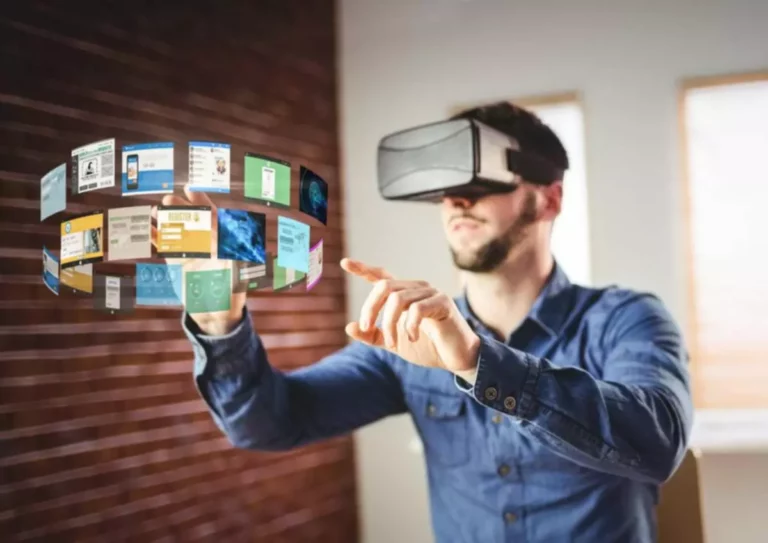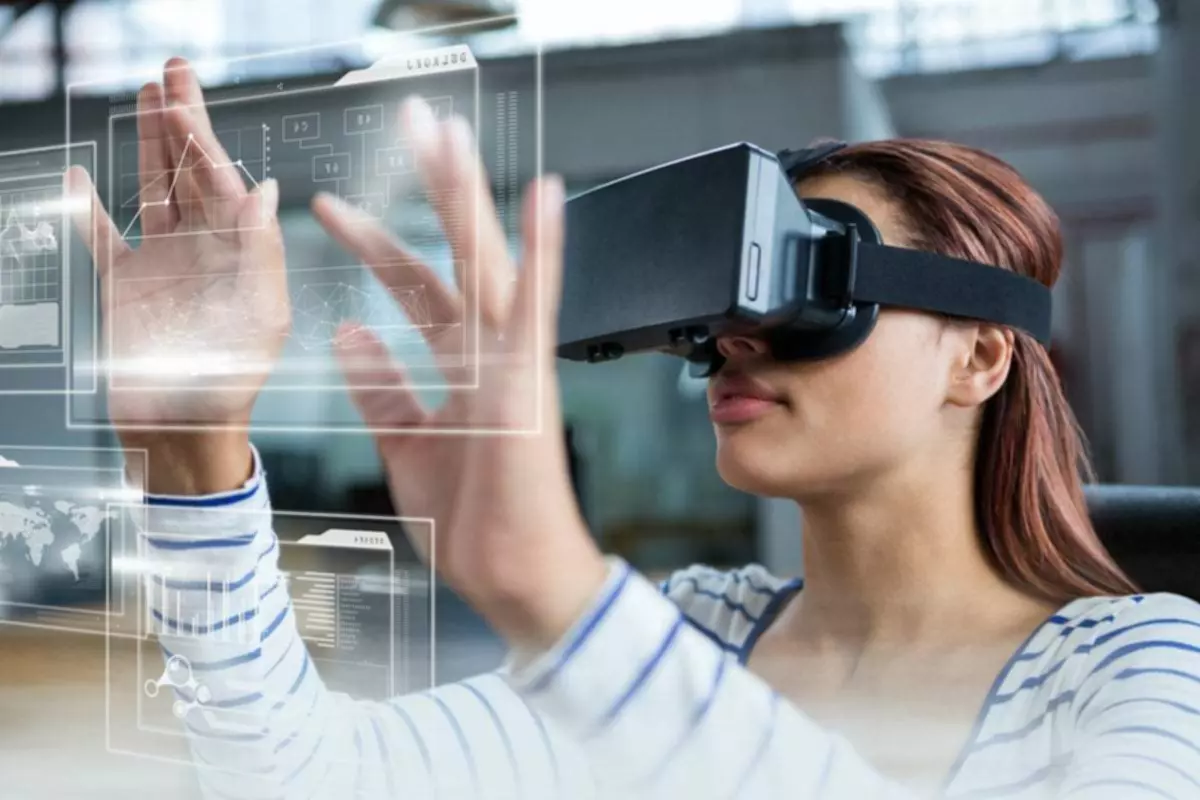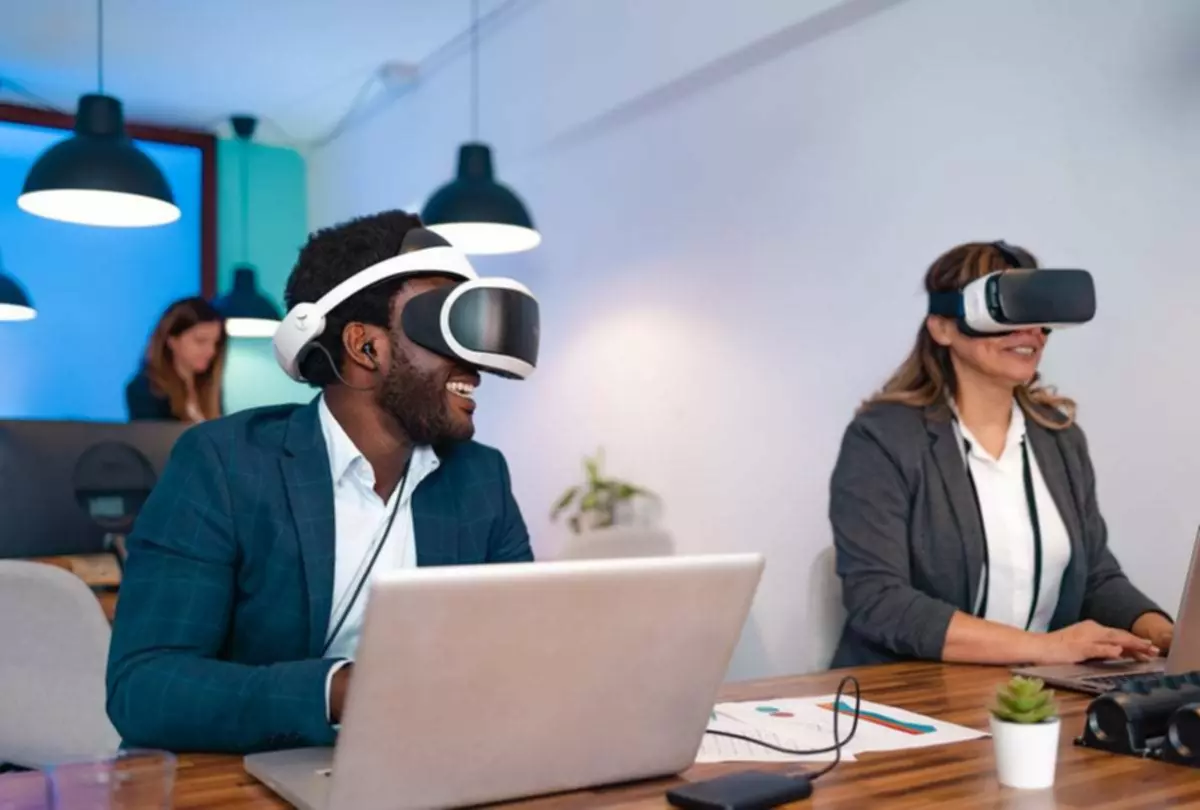VR For Business: Integration and Benefits

Virtual reality for business has become our present-day reality. It’s not just an element of science fiction; it’s something we can use and enjoy. Moreover, VR technology has become beneficial for businesses. Several industries have already integrated the new technology and are enjoying its advantages.
VR provides a controlled environment for simulating real-life circumstances with minimal to no risk to the user. Check out this article to learn what benefits VR offers to your business and what industries successfully incorporated this technology into their business processes.
Virtual reality (VR) vs. Augmented reality (AR)
Before we reveal what benefits VR for business offers, let’s find out what VR is and how it is different from AR. Augmented reality merges the digital and physical worlds. It is a technology that works well on both mobile devices and desktop computers. One peculiar feature which distinguishes AR from other technologies is its ability to reflect digital components in the real-world environment.
Virtual reality is a virtual experience that can take place anywhere in the world. Most people are familiar with VR headsets that look like glasses or goggles which they fit over their heads.
The most significant difference between AR and VR is that the last one is a computer-generated simulation. VR is a visual representation of a created reality or an alternate universe. The person using a headset is completely immersed in the digital environment. At the same time, an AR headset or glasses incorporate digital elements into the real world.
This distinction also means developers use different technologies to create VR and AR gear. VR headsets require the usage of sensors that transform real-world motions into a created environment.


We are confident that we have what it takes to help you get your platform from the idea throughout design and development phases, all the way to successful deployment in a production environment!
VR benefits for businesses
Most people believe that VR technology is about entertainment and gaming. However, VR for business isn’t limited to one industry. Virtual reality technologies offer benefits to many firms and organizations in various fields. Let’s check out some of these advantages.
Better prototyping
With VR technology for business, an enterprise can take product development to a whole new level. Industries may embrace VR technology to develop their products with improved accuracy. Integrating virtual reality into development should help with more accurate product design.
Moreover, companies gain a chance to plan product functionality effectively. VR technologies might offer an efficient approach to uncovering design flaws and making changes during development. This method should help companies reduce the costs of fixing product flaws during post-production.
Effective immersive corporate training
Integrating VR elements is a fantastic approach to providing workers with an immersive training experience. Real heavy machines and complex equipment are too dangerous and expensive to use in an educational environment. VR services are more affordable, offer a deep learning process in a virtual space, and are safer.
Thus, virtual reality technologies provide secure and cost-effective platforms for teaching staff. VR enables companies to build immersive simulations of dangerous circumstances. Engaging in 3D realities encourages workers to participate more actively in training sessions.
VR may also set up soft skills training experiences for the staff. For example, VR simulations help your employees train to market products. This experience should also be helpful for the support team when dealing with unsatisfied customers.
Improved business meetings
Traveling around the world for business meetings is challenging and expensive. On the other hand, a lack of communication leads to expensive mistakes and lost productivity. Companies get a chance to make business meetings more efficient by using virtual reality technologies.
Virtual meetings where partners see one another link individuals all over the world. VR services are more immersive than Zoom meetings and have the potential to change the entire business industry by lowering or eliminating travel expenses.

A competitive edge
Incorporating virtual reality services into your business gives you a competitive advantage. VR technology may dramatically boost the speed and efficiency of product development and digital marketing, allowing your company to stay ahead of the competition. While other companies are still deciding whether it’s worth using virtual reality tech, you may enjoy all the benefits.
Time and cost-effective properties
As mentioned, VR technology significantly reduces costs and time spent on prototyping. Instead of fixing mistakes, you may avoid doing them. Thus, you save time and money that you can spend elsewhere to improve your team’s work. Minimized expenditure on travel and meetings with partners opens the possibility of investing funds in other vital business areas.
Improved marketing
Employing traditional advertising tactics may not be as beneficial as before. Instead, consider using VR technology in advertising. VR-powered ads attract more attention and are more effective.
Companies should aim to offer more exciting advertisements to clients to convert prospects into consumers. Virtual reality may trigger customers’ interest to click on the ad and buy your products. Immersive marketing initiatives help build trust, increase brand awareness, and boost revenue growth.
Integration of virtual reality elements into the products
Given the information above, entertainment, marketing, digital, retail, and other industries may benefit from incorporating virtual reality technologies into their businesses. But what about other examples of industries where we can use VR? Keep reading to learn about real-world use cases of virtual reality technologies.
Healthcare
The most critical advantage VR technology offers to the healthcare industry is training. Virtual reality creates an environment to learn and improve skills to use in the real world. Medical specialists responsible for precise surgeries may train their skills in simulated settings. They may experience identical situations that happen in the real world. Such training should help save lives.
Medical workers who must become acquainted with the hospital setting get a chance to train without stress. The technology may also offer benefits for cognitive behavior therapy. Individuals with phobias or anxieties work through their issues in safe environments.

Military and space
Military and space are two dangerous industries. Employees must work in hazardous settings that are not widely accessible. Thus, virtual reality provides a secure environment similar to the one people encounter in real-life situations. Individuals can acquire necessary skills in controlled settings instead of training in dangerous conditions.
Virtual reality allows individuals to go through training with minimum danger. Moreover, VR tech assists soldiers suffering from war trauma to overcome these circumstances. VR may also prepare soldiers and astronauts to react in new or unpredictable scenarios.
eCommerce
The eCommerce and retail industry has rapidly expanded during the last decade, and the global pandemic gave it a considerable boost. The massive popularity of online purchases was also accelerated due to quicker internet connection and improved logistics, which enable next-day deliveries.
It sounds like the eCommerce industry has it easy, but that’s not the case. Around 70% of online customers abandon their orders even after adding products to their carts. All eCommerce firms are constantly seeking new beneficial technologies, marketing tactics, and ways to maximize the number of users who complete their purchases.
VR is one of the new technologies that eCommerce firms are looking to embrace to help fuel future sales growth and convert more visitors into consumers. How can VR for business help eCommerce? Virtual reality elements improve the visitor’s experience by combining the benefits of easy purchasing online with brick-and-mortar elements.
Sometimes users are excited to visit the brick-and-mortar type of store, but they don’t have time or can’t visit a physical shop because of specific reasons. VR technology for business incorporates brick-and-mortar elements into online shopping.
Clients still shop from the convenience of their homes and have products delivered quickly. However, thanks to virtual reality, customers will be provided with the exciting factors that make shopping in physical stores enjoyable. Users can shop with friends, try out clothing items, and buy without long queues!
Architecture
Architects may use virtual reality technologies to see buildings they’re making despite them not yet being built! Moreover, they can understand how it feels to walk inside the building. VR technology allows them to test the area before it is completed and make modifications in real-time to ensure client satisfaction.
Digital marketing
We don’t like commercials and consider watching them a waste of time. This peculiarity makes marketers’ jobs more difficult. How could they entertain consumers, so they decide to buy the marketed product? With VR!
Clients sometimes need to learn how to use a specific product. They want to understand how a product works and whether they can use it in the future. VR technology allows marketers to create environments where customers can see how products work.
Overall, VR has a wide range of use cases in digital marketing. Retailers might show buyers how a product would look in their house. Non-profit organizations may also create ads that truly attract the attention of people worldwide to specific issues.
Education
Despite education being an industry often reluctant to adopt new trends and technology, virtual reality has already shown much potential in this field. VR can be useful both for children and adults learning new skills.
Adults use VR in business, specifically to train employees. However, children also benefit from VR, and not in the form of games. VR technology helps kids better perceive history or geography lessons by offering an immersive experience. Other benefits include organizing trips without traveling to a foreign location, learning about the world in the form of a game, etc.
Top Articles
Container vs VM (Virtual Machines): How Do They Differ?
I am here to help you!
Explore the possibility to hire a dedicated R&D team that helps your company to scale product development.






